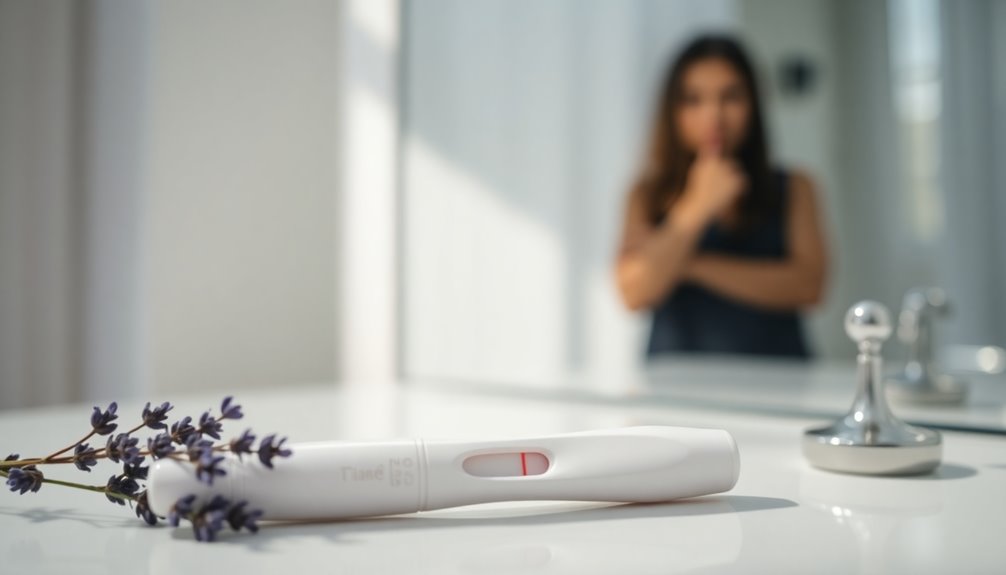You can accurately take a pregnancy test about 10 to 14 days after unprotected sex. This timing allows the hormone hCG to rise to detectable levels after implantation. Testing too soon could lead to false negatives since hCG may not be high enough to register on the test. If you receive a negative result but still suspect pregnancy, retesting a few days later is a good idea. For the best results, use the first morning urine, as it has the highest concentration of hCG. There's more to reflect on about testing options and results, so keep looking for helpful information.
Key Takeaways
- Wait at least 10-14 days after unprotected sex for the most accurate pregnancy test results.
- Testing too early may lead to false negatives due to low hCG levels.
- Home pregnancy tests can detect hCG levels after implantation, which occurs about six days post-fertilization.
- Morning urine typically provides the most concentrated hCG, enhancing test reliability.
- Consult a healthcare professional for blood tests, which can detect pregnancy as early as one week post-conception.
Understanding Pregnancy Timing
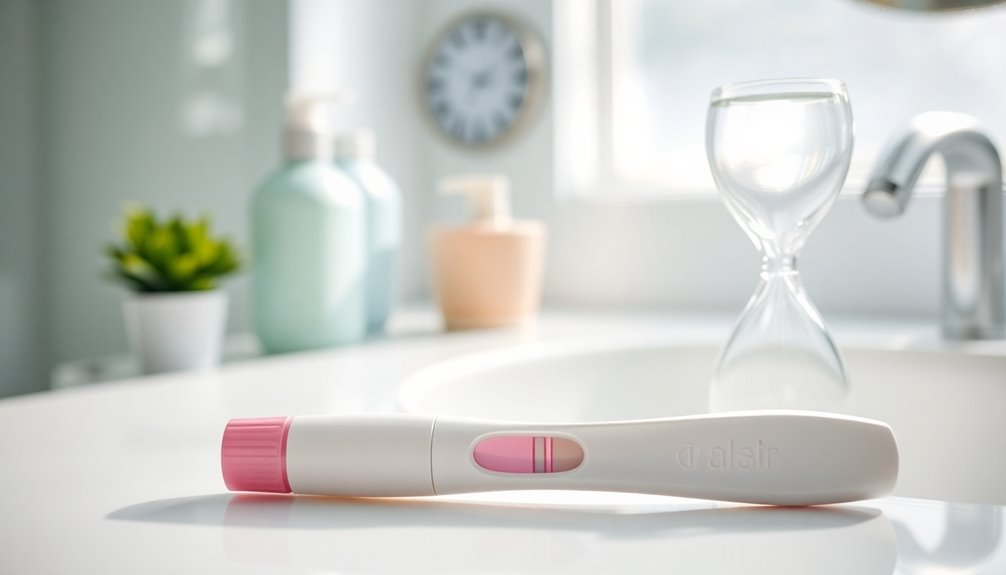
Understanding pregnancy timing is essential if you're trying to determine whether you might be pregnant. After unprotected sex, it can take up to six days for the fertilized egg to develop and travel to the uterus.
Once it implants, hCG levels begin to rise, but this hormone typically won't be detectable until about six days post-fertilization. For an accurate test, it's best to wait until at least the first day of your missed period.
Testing too early might result in false negatives due to low hCG levels. Knowing your menstrual cycle helps pinpoint ovulation and potential conception timing, making it easier to decide when to take a pregnancy test and avoid unnecessary stress.
When to Test for Pregnancy
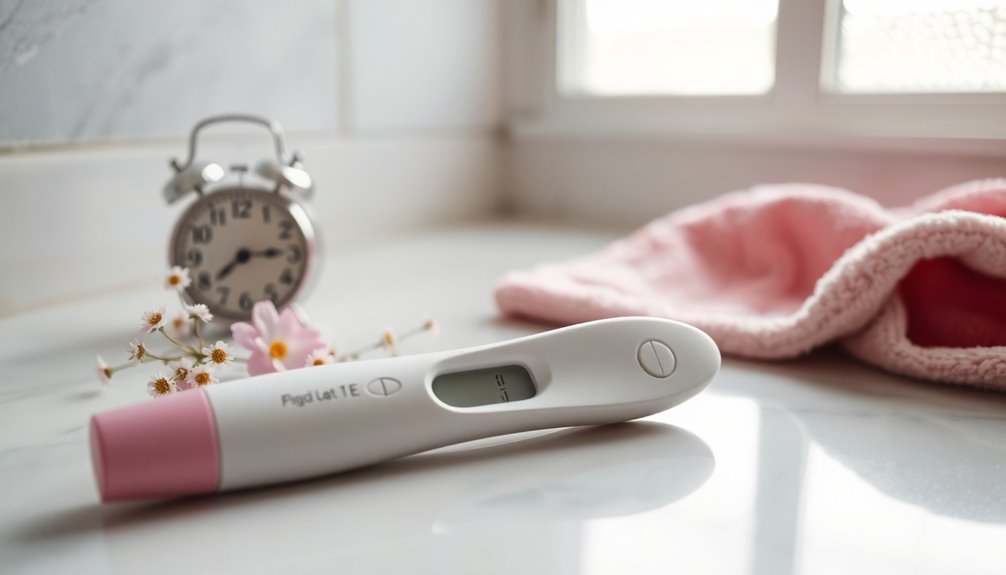
Knowing when to test for pregnancy is essential for getting accurate results.
You'll want to wait until at least 10-14 days after unprotected sex for the best accuracy, and some early detection tests can pick up pregnancy even earlier.
However, testing too soon might lead to false negatives, so timing matters.
Optimal Testing Timeline
The ideal time to take a pregnancy test is after the first day of your missed period, as this provides the best chance for accurate results. If you're unsure of your cycle timing, wait at least 21 days after unprotected sex. Testing too early might lead to a negative result, even if you're pregnant, due to insufficient hCG levels.
| Timing | Considerations |
|---|---|
| Missed Period | Best time for accurate results |
| 21 Days After Sex | For unpredictable cycles |
| 6 Days Before Missed | Possible but may lead to false negatives |
| Retest if Negative | Especially with irregular cycles |
Timing matters, so be patient and test when it's most effective!
Early Detection Tests
While you may be enthusiastic to find out if you're pregnant, it's vital to choose the right time to take an early detection pregnancy test.
These tests can be taken as soon as six days before a missed period, but accuracy is often lower then. For the most reliable pregnancy test results, consider these key points:
- Wait at least 10-14 days after unprotected sex for accurate results.
- Understand that human Chorionic Gonadotropin (hCG) levels need time to rise.
- Testing on the first day of your missed period usually provides the best accuracy.
Factors Affecting Accuracy
Timing is key when it comes to accurately determining pregnancy. For the best results, take a pregnancy test about 10-14 days after unprotected sex, allowing enough time for hCG levels to rise.
Testing too early can lead to false negatives, as the hormone may be too low to detect before implantation. While some home pregnancy tests can identify hCG as soon as six days post-fertilization, sensitivity varies by brand, affecting accuracy.
To enhance reliability, use morning urine, which typically has a higher concentration of hCG. Finally, be sure to follow the test kit's instructions carefully, including waiting the appropriate amount of time for results, to avoid misinterpretation and guarantee accurate outcomes.
Factors Affecting Test Accuracy
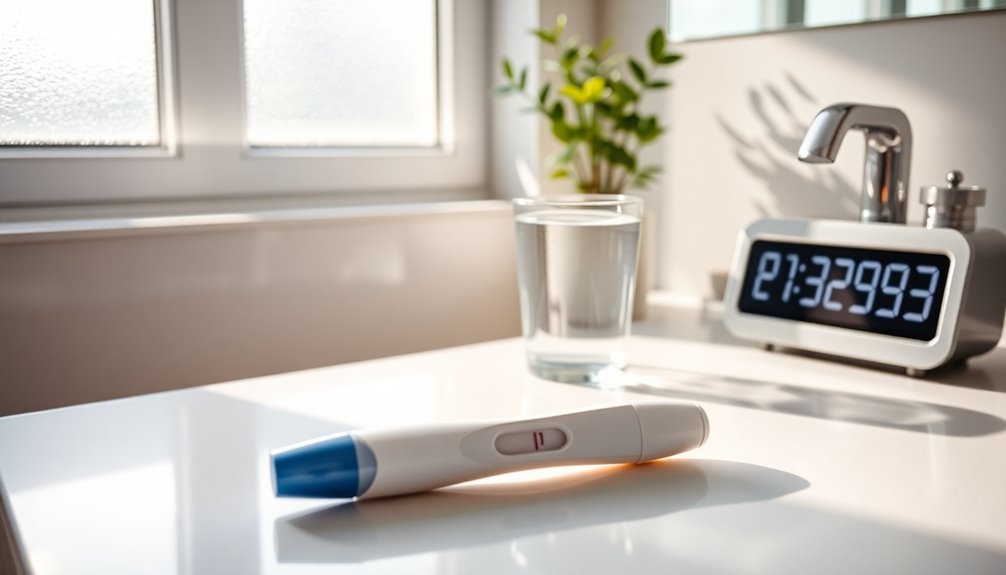
Factors influencing the accuracy of pregnancy tests can considerably impact your results. To guarantee you get a reliable pregnancy test result, keep these factors in mind:
- Timing: Testing too early can lead to false negatives since it may not detect the hormone hCG yet.
- Usage: Following the instructions accurately is vital; improper use can compromise the accuracy of home pregnancy tests.
- Health Conditions: Irregular periods or certain medications may affect hCG levels, so it's important to consult a healthcare provider if results are unclear.
Locations for Testing Options
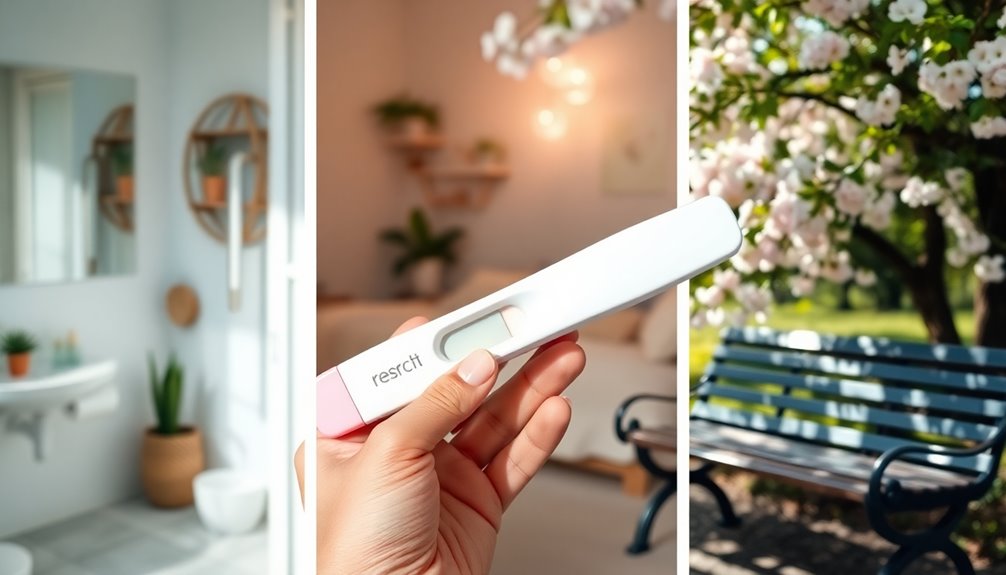
When it comes to confirming a possible pregnancy, knowing where to test can make the process easier and less stressful. You can purchase a home pregnancy test at pharmacies or supermarkets for convenient testing.
If you prefer a confidential option, many sexual health services offer free pregnancy tests. For those under 25, young people's services like Brook centres provide free testing and support tailored to your needs.
Additionally, general practitioners (GPs) often offer pregnancy tests at no charge, along with personalized consultations afterward.
If you need immediate testing, clinics usually don't require an appointment, so you can walk in and get the reassurance you need without delay.
Interpreting Test Results
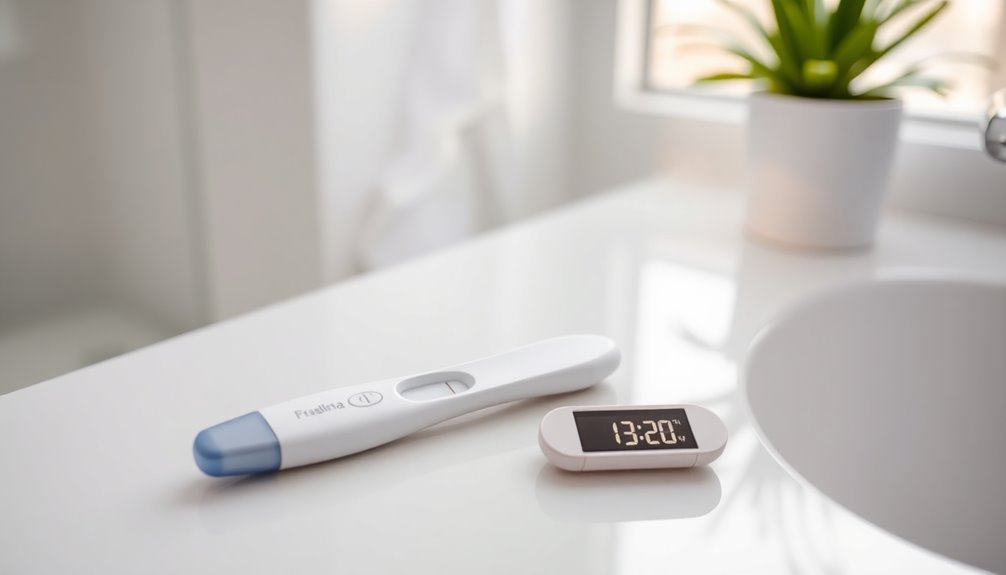
When you get your test results, it's essential to understand what they mean.
Two lines usually mean you're pregnant, while one line indicates you're not.
If you see a faint line, consider retesting in a few days for a clearer answer.
Understanding Test Accuracy
Understanding the accuracy of a pregnancy test is vital, especially since even a small misstep can lead to confusion. Home pregnancy tests can achieve up to 99% accuracy when used correctly, detecting hCG about 10-14 days after conception.
To guarantee reliable results, consider these key points:
- Always check the expiration date of your pregnancy test.
- Use first-morning urine for higher hCG concentration.
- Retest if you get a faint line or negative result but suspect pregnancy.
Improper usage, like using an expired test or not following the instructions, can compromise accuracy.
Additionally, factors such as diluted urine from excessive drinking or certain medications can affect outcomes. Timing and proper testing techniques are vital for accurate results.
Positive vs. Negative Results
Interpreting the results of a pregnancy test is essential for anyone hoping to confirm or rule out pregnancy. A positive result usually means hCG is present, indicating pregnancy, as this hormone starts being produced about six days post-fertilization.
Conversely, a negative result generally means no pregnancy, often indicated by a single line. However, faint lines can suggest low hCG levels, which may require retesting after a few days.
Be aware that false negatives can occur if you test too early, usually before 10-14 days after conception. Home pregnancy tests are up to 99% accurate when used correctly, but improper usage or expired tests could lead to inaccurate results, so always consult a healthcare provider if you're uncertain.
Timing for Retesting
If you suspect you might be pregnant but receive a negative result, it's wise to wait a few days before retesting. This allows hCG levels to rise to detectable amounts.
Consider the following:
- Testing too early, especially before a missed period, can lead to false negatives.
- If your cycle is irregular, retesting after a few days is essential for accurate results.
- Home pregnancy tests are up to 99% accurate when used correctly.
Emergency Contraception Insights
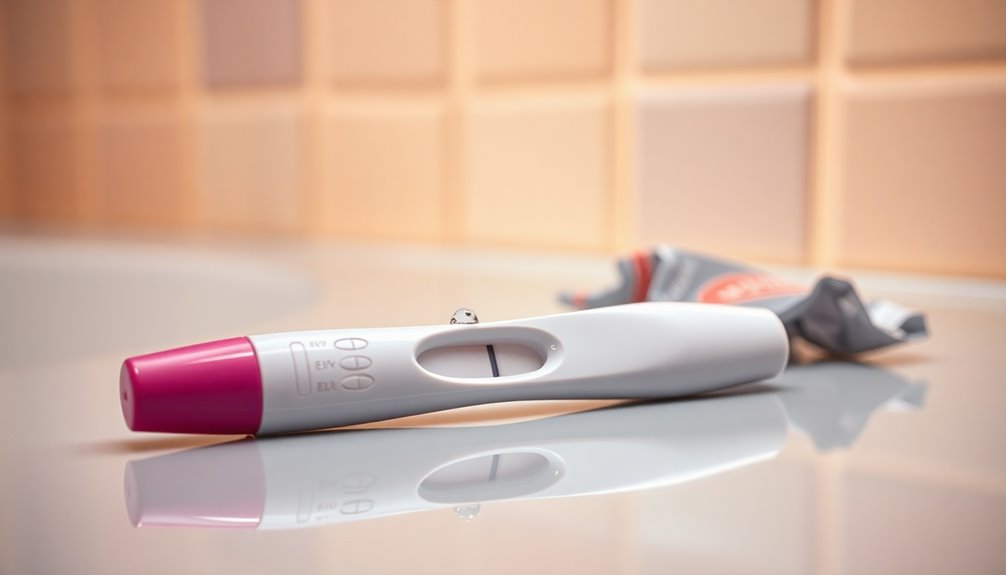
When faced with the possibility of an unintended pregnancy after unprotected sex, it's important to know your options for emergency contraception. There are various forms available that work best when taken promptly. Pills like levonorgestrel (Plan B) and ulipristal acetate (Ella) delay ovulation and can be effective up to 5 days post-intercourse. Alternatively, a copper IUD can be inserted by a healthcare provider within that same timeframe. Remember, emergency contraception won't terminate an existing pregnancy; it's designed to prevent a positive pregnancy test.
| Type | Timeframe Available |
|---|---|
| Plan B (Levonorgestrel) | Within 72 hours |
| Ella (Ulipristal Acetate) | Up to 120 hours |
| Copper IUD | Within 5 days |
Always consult a healthcare provider for personalized advice.
Seeking Professional Advice
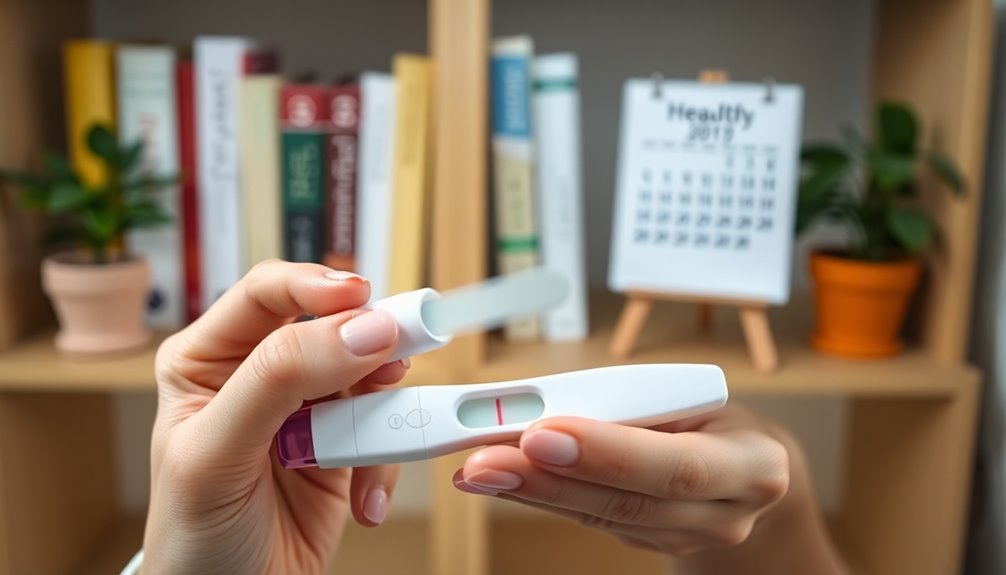
Seeking professional advice is essential for anyone traversing the uncertainty of potential pregnancy. A healthcare professional can guide you on when to take a test and provide accurate insights tailored to your situation. They can also conduct blood tests that detect pregnancy as early as one week after conception, offering more reliable results than home tests.
Consider these benefits of consulting a professional:
- Help with interpreting test results
- Access to prenatal care options if pregnancy is confirmed
- Emotional support and counseling based on your needs
- Additionally, understanding your financial needs during this time can be crucial, especially if you are facing potential changes in your personal circumstances.
Don't hesitate to reach out to organizations like Planned Parenthood for confidential resources.
Getting professional advice not only clarifies your options but also offers the emotional support you may need during this time.
Frequently Asked Questions
How Long After Sex Will I Get a Positive Pregnancy Test?
You'll typically get a positive pregnancy test about 10 to 14 days after unprotected sex.
This timeframe allows for implantation and enough hCG to build up in your system.
Some sensitive tests claim they can detect pregnancy even six days before your missed period, but testing too early might lead to false negatives.
If your test is negative and you still suspect pregnancy, wait a few days and test again.
How Many Days After Sex Will I Know if I'm Pregnant?
When you wonder how many days after sex you'll know if you're pregnant, consider a few key factors.
It typically takes about 10 to 14 days for pregnancy to be confirmed, as your body needs time for fertilization and implantation.
If you have a regular cycle, waiting until the first day of your missed period gives the most reliable result.
If your cycles are irregular, try testing again a few days later for clarity.
How Soon Will a Pregnancy Test Read Positive?
A pregnancy test can read positive typically 10-14 days after conception, which usually happens around 6 days after unprotected sex.
If you test too early, you mightn't see a positive result due to low levels of the hCG hormone.
For the most accurate reading, wait until the first day of your missed period. That way, you'll have a higher chance of getting reliable results when you take the test.
How Long Does It Take for Hcg to Show up in Urine?
Imagine waiting for a flower to bloom; that's similar to how long it takes for hCG to show up in your urine.
Generally, it takes about 10 to 14 days after conception for hCG levels to reach a detectable amount.
If you're anxious to know, testing too early might lead to disappointment, as results can be unreliable before then.
For the best chances, wait until after a missed period for a clearer answer.
Conclusion
In the journey of understanding pregnancy, timing is your compass. Waiting at least a week after a missed period gives you the clearest results. Remember, factors like testing method and hormone levels can sway accuracy, so choose wisely. Whether you test at home or seek a pro's advice, don't hesitate to reach out if you're unsure. Your body's whispers deserve to be heard, guiding you toward the right next steps in your unique story.

